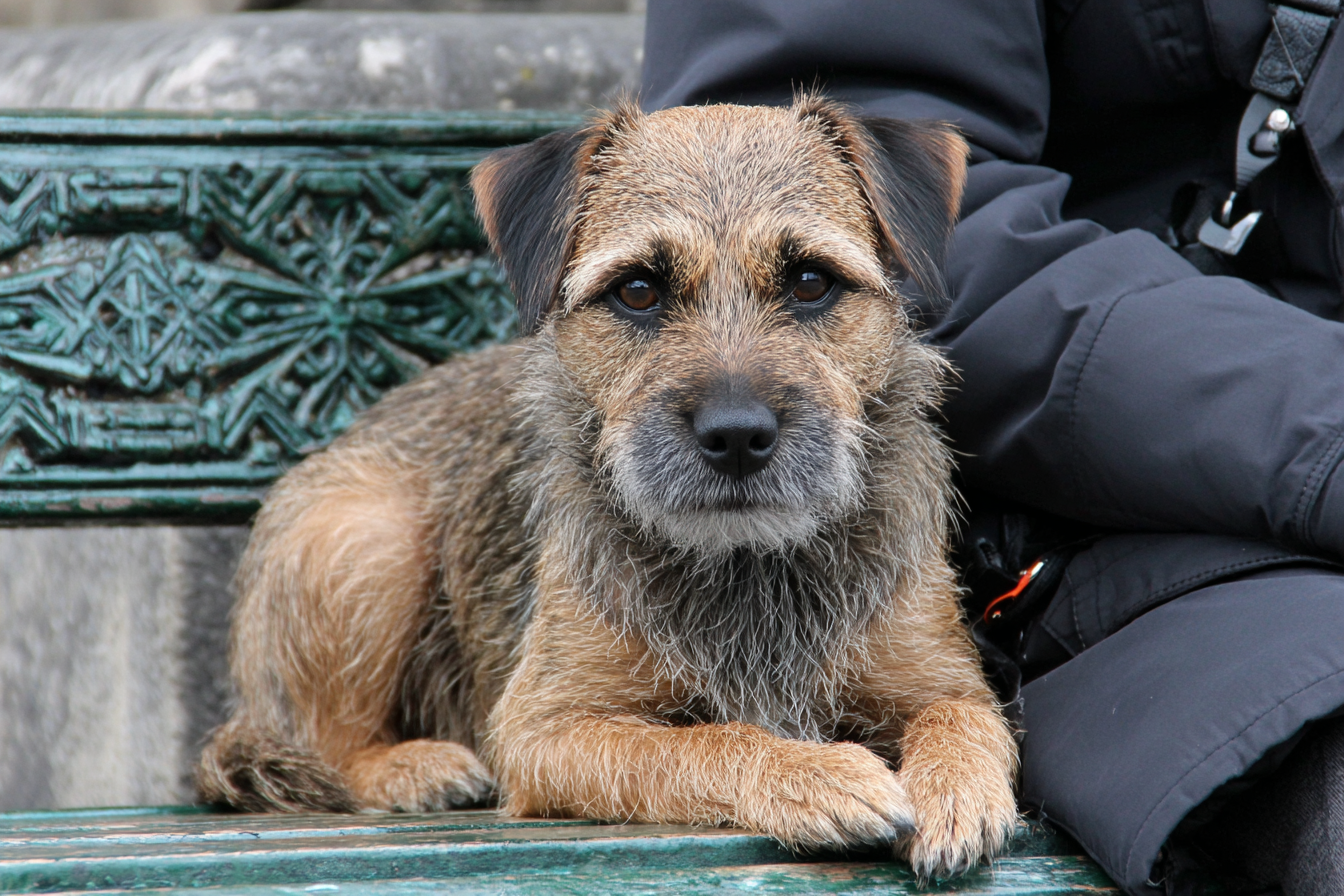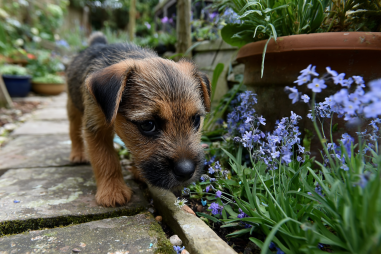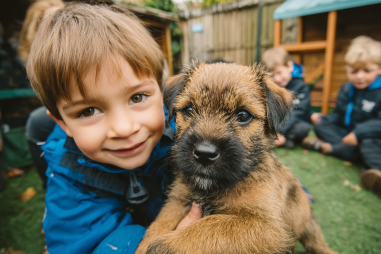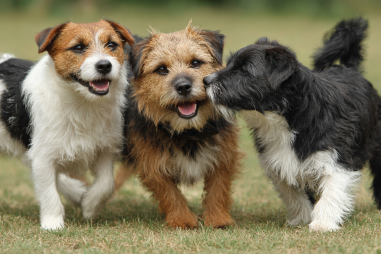Border Terriers are a delightful breed, celebrated for their spirited and affectionate nature. If you’re considering bringing one into your home, or if you already have one, understanding their unique temperament and behavior is key to fostering a joyful and harmonious relationship. This breed’s lively personality combined with a strong hunting instinct makes them both charming companions and energetic pets. Let’s dive into the nuances of Border Terrier temperament and behavior to help you meet their needs and appreciate all the wonderful traits they bring to your life.
General Temperament Traits of Border Terriers
Border Terriers are known for being friendly, intelligent, and energetic dogs. They have a natural curiosity and a zest for life that makes them playful and engaging companions. These dogs are often described as affectionate and loyal to their families, forming strong bonds with their owners. Despite their spirited personality, they are generally quite gentle, which makes them great pets for families with children.
One defining characteristic of Border Terriers is their high energy level. They require plenty of exercise and mental stimulation, as they were originally bred to hunt foxes and other small vermin, working tirelessly throughout the day. This working dog heritage means that they are alert, agile, and constantly ready for action.
Border Terriers are also known for their intelligence and generally easy trainability. They enjoy learning new commands and tricks and respond well to consistent, positive reinforcement training methods. However, their independence and determination, typical of terriers, can sometimes make them a bit stubborn.
Social Behavior with Family and Other Pets
One of the most appealing aspects of Border Terriers is their sociability. Within the family environment, they tend to be affectionate and playful, often forming close attachments with all family members. Their cheerful disposition makes them excellent companions for children, though supervision is always advised to ensure gentle interactions.
Socialization is a crucial aspect of raising a Border Terrier. Properly introduced to other dogs and pets at an early age, Border Terriers usually get along well with other animals. However, their natural prey drive means they might have to be carefully managed around smaller pets like hamsters, rabbits, or birds, as they may see these animals as something to chase.
Border Terriers typically enjoy the company of other dogs and often thrive in multi-dog households when given sufficient exercise and attention. Their playful nature often leads to lively interactions with other dogs, allowing them to burn off energy and satisfy their need for social engagement.
Common Behavioral Challenges
While Border Terriers are wonderful pets, they come with some behavioral challenges owners should be prepared for. One of the most common issues is their strong prey drive. This instinct can lead to chasing after small animals, cars, or even people, which can be dangerous if not properly managed.
Another challenge is their tendency toward digging. Originally bred to pursue animals underground, many Border Terriers naturally dig in yards or gardens, which can frustrate owners who prefer to keep their outdoor spaces intact.
Because they are energetic and highly intelligent, Border Terriers can become bored quickly if not given enough physical or mental stimulation. Without adequate exercise, they may develop destructive behaviors, such as chewing on furniture, excessive barking, or trying to escape their confines.
Lastly, their independent streak means that training can sometimes be a test of patience. Border Terriers may choose to ignore commands if they are distracted or simply feeling stubborn, so consistent and gentle guidance is essential.
How to Nurture Positive Behavior
Encouraging good behavior in a Border Terrier starts early and hinges on consistency, patience, and positive reinforcement. Reward-based training techniques using treats, praise, or play are particularly effective. These methods build trust and make learning enjoyable for this smart breed.
Daily exercise is vital. Aim to provide both physical activities, like walks, runs, or play sessions, and mental challenges, such as puzzle toys or obedience games. This helps keep their mind sharp and body healthy, reducing the risk of boredom-related behaviors.
Providing a structured routine also helps Border Terriers feel secure and understand what is expected of them. Regular feeding times, designated playtimes, and set training sessions give them a sense of predictability that supports good behavior.
Socialization should continue throughout their life, exposing them to new people, animals, and environments in a positive way. This prevents fearfulness or aggression and fosters a well-rounded, confident pet.
Signs of Stress or Anxiety in Your Dog
Understanding your Border Terrier’s body language is important for recognizing when they might be feeling stressed or anxious. Common signs include:
- Pacing or restlessness
- Excessive barking or whining
- Yawning or lip licking when not tired or hungry
- Hiding or avoiding social interactions
- Destructive behavior such as chewing or digging
- Repeatedly scratching or biting themselves
Stress and anxiety can stem from a lack of stimulation, changes in the environment, loud noises, or separation from family. Recognizing these signs early allows you to intervene by providing calming activities, more exercise, or even consulting a professional if needed.
Training to Enhance Good Behavior
Effective training for Border Terriers should start as soon as you bring them home and continue throughout their life. This breed thrives on challenges and learning new skills, so keeping training sessions short, fun, and consistent is key.
Basic obedience commands like “sit,” “stay,” “come,” and “leave it” are essential for safety and control. Teaching your Border Terrier to respond reliably helps manage their energy and natural hunting instincts, especially when off-leash.
Positive reinforcement methods have proven highly successful with this breed. Using treats, toys, or verbal praise encourages good behavior without the stress of punishment. Border Terriers respond best when training sessions are engaging and rewarding.
Socialization training remains critical, especially exposing them to different people, dogs, and situations. Controlled playdates, puppy classes, and regular trips to dog-friendly areas all contribute to their confidence and adaptability.
Enjoying Life with Your Border Terrier
Living with a Border Terrier means embracing their lively spirit and affectionate heart. These dogs love to be involved in family activities and thrive when they have a job to do. Whether you enjoy hiking, agility training, or simple backyard play, your Border Terrier will eagerly join in.
Providing a balanced lifestyle that mixes exercise, mental challenge, social time, and rest will cultivate a happy and well-behaved dog. Delighting in their quirky personalities and nurturing your bond through consistent care makes life with a Border Terrier incredibly rewarding.
Ultimately, understanding their temperament and behavior empowers you to meet their needs, prevent problems, and enjoy a deep connection built on trust and mutual respect. Border Terriers bring joy, companionship, and vibrant energy to any home fortunate enough to call one family.







